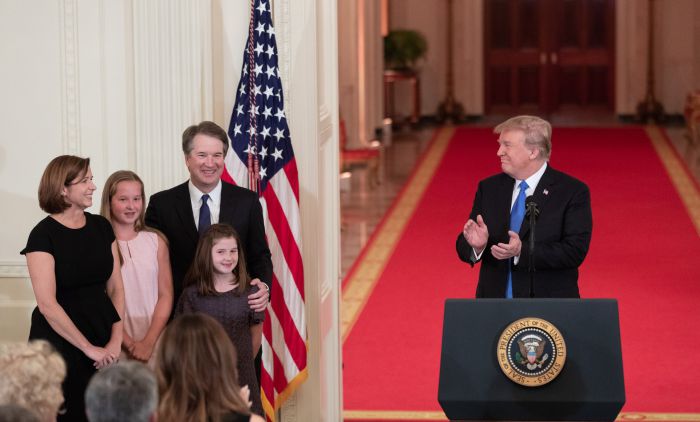Brett Kavanaugh is expected to bring his pro-business bent to the Supreme Court; the DOJ is appealing the AT&T-Time Warner merger approval; Britain fines Facebook and the EU is expected to fine Google; and who really benefits from the GOP’s tax cuts?

- President Trump’s nomination of Judge Brett Kavanaugh to the Supreme Court was received with cheers by corporate America. “The Champagne corks are going to pop at the Chamber of Commerce and in the C.E.O. offices across America,” one consumer rights advocate told the New York Times. A one-page memo circulated by the White House to business groups shortly after the announcement of Kavanaugh’s nomination said: “Judge Kavanaugh protects American businesses from illegal job-killing regulations.” What would the likely impact of Kavanaugh’s appointment be, given his strong pro-business bent on issues related to regulation, labor rights and consumer protection? The Times’ Matthew Goldstein and NPR’s Gretchen Frazee review Kavanaugh’s track record on the DC Circuit Court for clues. In Crooked.com, Jordan Klein, Ian Samuel, and Sean McElwee try to measure Kavanaugh’s likely impact on the Court.
- The Department of Justice is appealing the court approval of the Time Warner-AT&T merger. Last month, Judge Richard Leon ruled that the $85.4 billion deal was legal and imposed no conditions on the merger (see Randal Picker’s and Chris Sagers’s analyses of the decision here and here). Now, the government is asking the DC Circuit Court of Appeals to overturn the decision. AT&T CEO Randall Stephenson insisted on Thursday that despite the appeal, “the likelihood of this thing being reversed or overturned is really remote.” The case, notes CNN’s Hadas Gold, could end up in front of the Supreme Court, which “has not taken up a merger case since the 1970s.”
- Rupert Murdoch’s takeover of Sky has been cleared by Britain’s newly appointed culture secretary, Jeremy Wright. The approval follows a decade-long attempt by Murdoch to take complete control of Sky. However, Sky is still the subject of a fierce bidding war between Murdoch and Comcast, whose own bid for Sky already received government clearance. (Comcast has also been engaged in a separate bidding war with Disney over 21st Century Fox’s film and TV studios.)
- In techlash news: Britain’s Information Commissioner’s Office will fine Facebook £500,000 for its role in the Cambridge Analytica scandal. While this is the maximum amount possible, it would take Facebook just 18 minutes to earn that amount. Google, meanwhile, is expected to face a multibillion-euro antitrust fine in Europe for abusing the dominance of its mobile operating system Android. In the Washington Post, Tony Romm reports that the EU fine could result in “major changes” to Android, the world’s most dominant mobile operating system. The expected fine, he writes, “highlights how Europe has become the world’s most aggressive regulator of American technology giants.” Also this week, Makan Delrahim, head of the DOJ’s antitrust division, signaled that his agency is comfortable with large tech firms buying up smaller rivals, citing what he called “great efficiencies” that come from tech mergers. The 700,000-member labor union Communications Workers of America, meanwhile, is the newest member of the growing coalition calling for a breakup of Facebook.
- Should Facebook, outwardly committed to fighting fake news, ban the conspiracy website InfoWars? This question has become the center of a heated debate after CNN reporter Oliver Darcy brought it up during a Facebook event this week. In Slate, April Glaser argues that the answer to this question wouldn’t matter so much if Facebook had not been allowed to become so big and dominant to begin with. “In a healthier marketplace, it might be less crucial that Facebook work harder to think through these issues. If there were five other massively popular social networks to choose from, Facebook could take down Jones’ pages and they could live elsewhere,” she writes.
- A new report by Stacy Mitchell and Olivia LaVecchia of the Institute for Local Self-Reliance (ILSR) details Amazon’s recent foray into local government purchasing. Last year, they report, Amazon “quietly secured” a $5.5 billion national contract “to provide cities, counties, and schools with office and classroom supplies, library books, electronics, and more.” The terms of the contract, they write, “depart in striking ways from established norms in public procurement, favoring Amazon at the expense of the public… the contract lacks standard safeguards to protect public dollars, and puts cities, counties, and schools at risk of spending more and getting less.” David Dayen summarizes the report and, in a separate piece published in Capital & Main, writes about the Supreme Court’s South Dakota vs. Wayfair ruling and why it immensely benefits Amazon. “Amazon’s continuous resistance to collecting sales taxes made it the first major American company to build its business based on tax avoidance,” he writes.
- Open Markets’ Lina Khan, one of Amazon’s most prominent critics, has joined the office of FTC Commissioner Rohit Chopra as the agency debates how to regulate Amazon and its fellow FAANGs.
- From The Economist: outside of the US, America’s tech giants are battling China’s tech giants.
- President Trump’s $1.5 trillion tax cut has triggered a record-breaking $436.6 billion wave of stock buybacks. “Corporate America’s actions suggest that most of the benefits of the corporate tax cut will flow to investors in general and top corporate executives in particular,” according to TrimTabs, an investment research company. Companies’ shares, however, are not rising all that much, suggesting that companies are “buying their shares at excessive valuations” instead of investing in things like factories or new technologies, according to the Wall Street Journal. “Corporate America is engaging in a stock buyback bonanza that isn’t even buying it short-term financial gains,” remarks New York’s Eric Levitz.
- The economic benefits from Trump’s tax cuts, according to a new paper by economists from San Francisco Federal Reserve Bank, will fall short of the “overly optimistic” expectations. “The true boost [to GDP] is more likely to be less than 1 percentage point,” they write. For the staffers who wrote the bill, however, the GOP’s tax cuts have been enormously beneficial: many of them, more than a dozen, according to a report from the New York Times’ Alan Rappeport, have since become lobbyists.
- For the past 18 months, former Obama officials have often taken to the media to decry the threats to American democracy posed by the Trump administration. In private, however, the Trump presidency has been very good for Obama veterans: “Many are lending the prestige of their White House resumes to scandal-fraught organizations in return for large sums of money. Some are even doing business with the Trump administration,” report HuffPost’s Zach Carter and Paul Blumenthal. Trump’s former national security adviser Mike Flynn, meanwhile, announced he would be joining a new lobbying firm founded by a registered foreign agent this week (despite currently awaiting sentencing after he pled guilty to lying to federal investigators), only to face immediate media backlash and quickly withdraw.
- Commerce Secretary Wilbur Ross said on Thursday that he would divest of his remaining stock holdings after the Office of Government Ethics’ acting director, David Apol, said Ross’s failure to divest of these assets “created the potential for a serious criminal violation on your part and undermined public confidence.” Bloomberg reports.
- Seven fast food chains—among them McDonald’s, Arby’s, Carl’s Jr., and Cinnabon—have agreed to end “no-poaching” rules that prevented employees from moving from one franchise to another and attracted a lot of regulatory scrutiny in recent years for suppressing workers’ wages. The announcement followed an investigation into the practice by Washington state’s Attorney General Bob Ferguson and similar probes in nine other states and the District of Columbia.
- A wide-ranging exposé of sexual harassment at HSBC by David Dayen explores the culture of sexual harassment that is so endemic to many financial institutions and demonstrates how whistleblowers end up being punished for speaking up.
- From the Financial Times: “the drug pricing playbook: how pharmaceutical companies keep costs high.”
- After a recent Guardian piece by Daniel Bessner delved into billionaire George Soros’s political philosophy, arguing that Soros’s “class position made him unable to advocate the root-and-branch reforms necessary to bring about the world he desires,” Soros takes to The Guardian to respond.
- As Trump’s trade war with China continues to escalate, is the system of global trade as we know it doomed anyway?
- Activist groups gathered outside the Federal Communications Commission building in Washington DC to deliver over 600,000 petitions demanding that the acquisition of Tribune by Sinclair Broadcast not be allowed to go through, reports Media Matters.
- Niskanen Center’s Brink Lindsey and Steven M. Teles have taken the premise of their best-selling book The Captured Economy: How the Powerful Enrich Themselves, Slow Down Growth, and Increase Inequality (of which we published a number of excerpts) as the starting point for a website that expands upon their analysis of special interests’ influence in various policy areas.
Chatter From the Ivory Tower
Columbia Business School professor Geert Bekaert was accused of making unwanted sexual advances and attempting to derail the career of former Columbia professor Enrichetta Ravina this week, as the trial concerning Ravina’s $30 million lawsuit against Columbia and Bekaert opened in Manhattan. During her testimony, Ravina claimed that after she spurned Bekaert’s advances and complained, both him and Columbia retaliated against her. Bekaert, she said, tarnished her reputation within the academic community and sabotaged her research, using his control of access to the data she relied on in her project to stall her work. Ultimately, she was denied tenure and is now teaching at Northwestern University.
Stigler Center Goings-On
- Do companies have too much power? A Quartz piece covers the academic debate over the increase in markups and cites James Traina’s Stigler Center working paper (and subsequent ProMarket post) on the subject.
- In the latest episode of the Capitalisn’t podcast, “The Reluctant Central Banker,” Luigi Zingales and Kate Waldock interview Sir Paul Tucker, a former official at the Bank of England during the 2008 financial crisis, about central banking and his new book Unelected Power.
Also, you can read ProMarket’s interview with Tucker here.
Disclaimer: The ProMarket blog is dedicated to discussing how competition tends to be subverted by special interests. The posts represent the opinions of their writers, not necessarily those of the University of Chicago, the Booth School of Business, or its faculty. For more information, please visit ProMarket Blog Policy.






